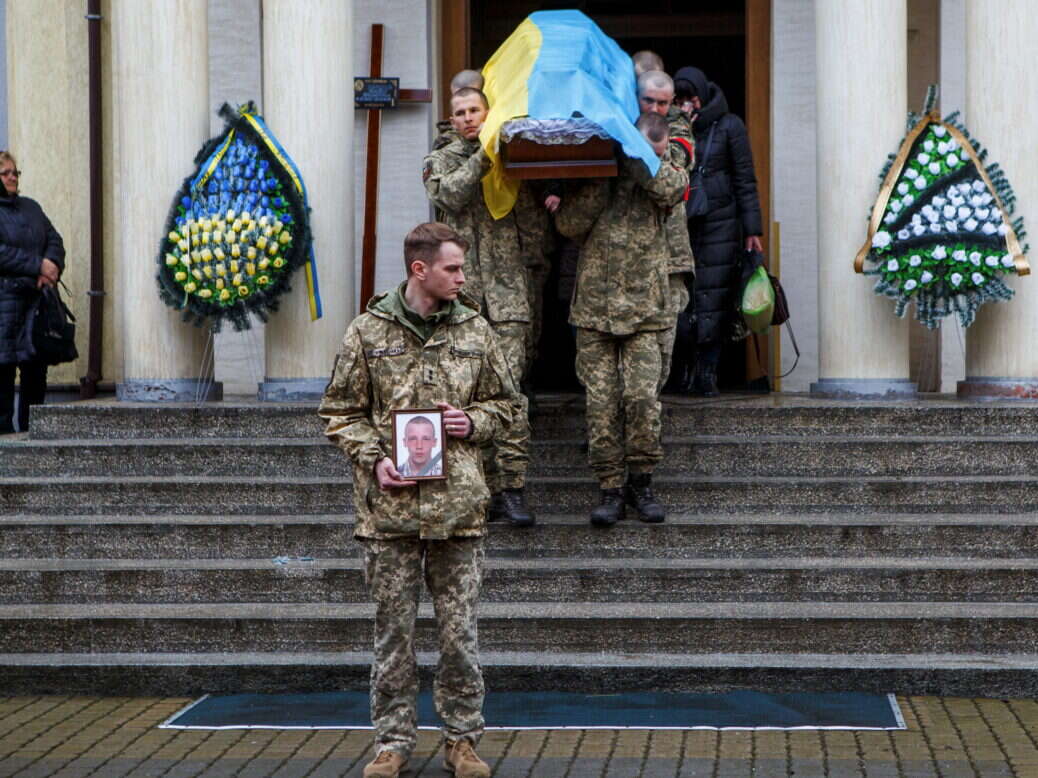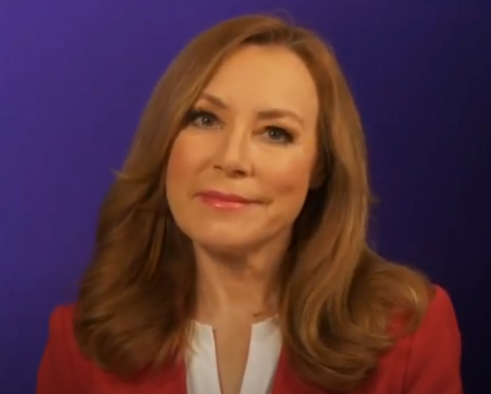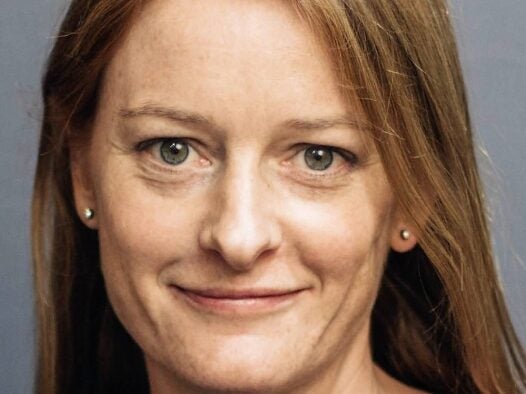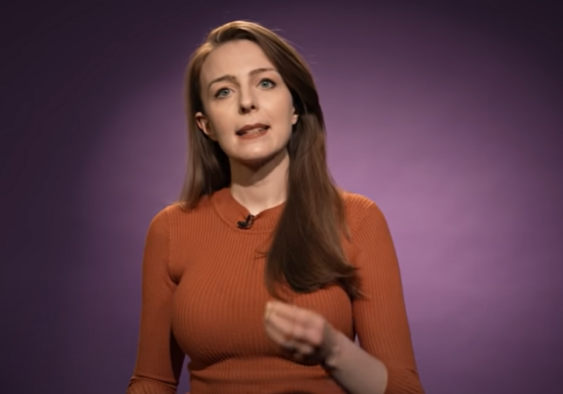
While the invasion of Ukraine has led to six journalists being killed – and many more injured – those covering the story in the UK are at risk of suffering psychological harm.
Over the weekend, social media feeds and news websites were full of distressing images from Bucha near Kyiv in Ukraine, where hundreds of dead bodies were found in the streets and in mass graves after Russian troops withdrew.
The Daily Mirror, The Times, The Financial Times and Metro all featured images of corpses on their front pages on Monday. Journalists sifting through supplied images and video will have seen material too upsetting to be published.
Scroll down for tips aimed at journalists and their managers to mitigate the risk of vicarious trauma in the newsroom.
Dr Sian Williams, a counselling psychologist and journalist who until Thursday was the main anchor at 5 News, told Press Gazette that in previous research she has done about “moral injury”, the journalist most affected by PTSD never left the newsroom.
Moral injury can include the guilt, shame or distress of covering challenging news events – for example, someone may feel guilt over their inaction or the people left behind in Ukraine.
Vicarious trauma risk up after Covid-19 pandemic
Williams, who will continue presenting a weekly Mind Matters segment for 5 News, said of her research participant: “She was watching images from Syria repeatedly, many of which would never see the light of day because they were simply too awful because there were children whose skin had been flayed because of the chemical attacks that were happening in Syria.
“So we would never see them on the telly but she was seeing them and she was processing them and her PTSD levels were higher than anyone else in that study.”

Dr Sian Williams. Picture: 5 News screenshot
Williams said she was concerned the risk of vicarious trauma was higher at the moment as, following two years of the Covid-19 pandemic, people “don’t feel that they don’t perhaps have as much psychological flexibility as normal”.
“We have been on a story that has touched us, professionally and personally and so a lot of us have been in an alert state, both because it’s a news story that doesn’t go away but also because it impacts us on other levels,” she said.
Ukraine story ‘clearly taking its toll’
Hannah Storm, co-director of Headlines Network which runs workshops and training to improve mental health in the media, agreed: “I’m concerned that there’s the risk of vicarious trauma but on top of that, I think it’s this fact that people are absolutely exhausted,” she said.
“We’ve had this relentless two years, which has taken an incredible toll on people, and now we’ve got this, one of the biggest news stories probably in the last 50 years really in terms of a conflict news story.”

Ethical Journalism Network chief executive. Picture: EJN
Storm, a former chief executive of the Ethical Journalism Network, said that she had heard anecdotally of journalists considering leaving the profession because “they’re that tired and they’re that worn out”.
“I would have thought in 2022 I wouldn’t be anecdotally hearing from people things like ‘my boss told another colleague that he should grow a thicker skin’ but I’m still hearing this and that really makes me sad,” she said.
“So I think that although there’s been a move in the last couple of years to improve conversations around mental health, there are still some parts of the media industry who think that just because you’re not on the ground reporting from Ukraine that you wouldn’t be impacted basically by reporting remotely.”
Storm added: “It might be that you have a team on the ground, but it’s really important that we also validate the work of people who aren’t necessarily on the ground as well.”
Risk of vicarious trauma up since Arab Spring
Williams agreed that attitudes had shifted during her 35-year career, but added: “I think there’s a way to go, both in the attitude of managers and newsrooms and leaders in modelling best behaviour, and also with journalists, to think it’s not just okay to talk about this stuff, but it’s actually essential.”
Williams also warned that experience of previous war reporting does not necessarily mean people are immune, after leading workshops with ITN, which produces 5 News, ITV News and Channel 4 News.
She said: “There will be a lot of people in our newsroom who don’t have the experience, who might not have seen Sarajevo stuff and Syria stuff and Iraq stuff [but] I have to say that experience doesn’t necessarily protect you from feelings of distress when you’re seeing this, it really doesn’t.”
Storm’s own first experience of vicarious trauma was in 2003 when she was asked to oversee footage coming in from the newswires of the bombing of Baghdad, Iraq.
But she said social media had meant the risk of vicarious trauma has “really increased” since the start of the Arab Spring uprisings just over a decade ago.
Judy King is editorial director at BBC Monitoring, which was set up in the Second World War and now has about 100 journalists in the UK and a similar number across the rest of the world observing the media and social media and writing about key themes that arise. It has a specialist disinformation unit and a specialist jihadist media unit.
King, who has worked for BBC Monitoring for 22 years, told Press Gazette: “It’s not a new phenomenon for us sadly, this is part of our everyday work so we take it extremely seriously and have a variety of different techniques that the journalists use to stay well whilst dealing with this sort of material.”
‘It’s a really important job’
In particular, she advocated managers making sure their journalists feel like their work is important and appreciated: “It’s a really important job that our journalists do,” she said. “Media is powerful and it’s important that people understand that and understand the different messages.
“I think if you feel there’s a reason for doing this work, it enables you to handle it in a way, that it’s not just for curiosity… there’s a real sense of purpose that this matters, that this job matters and therefore it’s important that the journalists feel that it’s important that they do that.
“We have this jihadist media team and their whole job really is looking at really some very difficult material but it’s important that people understand what’s being said, and how it’s being said, and so that then helps them.”
King noted that graphic material “impacts different people in different ways”, and individuals’ reactions and susceptibility can even change at different points in their career – for example after they have had children.
She added that it was important not to get into a mindset of feeling like “I’m the sort of person who can handle this”.
“Something we talk to staff about is whereas one day you might feel one way, you might feel sad momentarily or upset but it passes, on another day or another occasion it might affect you in a different way,” she said. “And just being aware of that and being open that this is something you should constantly be focusing on, your own mental health and your own mental well-being.”
Despite the often distressing nature of their work, King, who herself has worked at BBC Monitoring for 22 years, said the team has a low turnover of staff. Although it’s not for everyone, she said they try to be upfront about what the job involves during the recruitment process.
“I suppose for some people it’s a really great job because if you’re interested in a part of the world or a particular theme and working with the BBC, you have a chance to become really expert in something,” she said.
‘Shadow of Syria casts quite long’

Georgina Lee, who heads up the Channel 4 News Fact Check team. Picture: Channel 4 News screenshot
Channel 4 News Fact Check’s Georgina Lee told Press Gazette her newsroom had learned from the civil war in Syria – which has been dubbed the first social media war with vast amounts of material coming from non-journalists on the ground that had to be verified – the extent to which even journalists at home can be impacted.
She told Press Gazette: “I think the shadow of Syria casts quite long in the newsroom… we’re quite fortunate in some senses here because I think we do have a lot of an understanding – all the senior leadership team are proactively encouraging us to take up therapeutic services and counselling services and to take breaks in screen time and stuff like that.
“It’s horrible, but for some people, they’re facing this for the second time in their career or even third, fourth, fifth time, but there is the silver lining that there is experience of handling this in the newsroom.”
[Read more: Channel 4 News reaches record social media audience with Ukraine war explainers]
Lee said she tries to make sure she takes breaks rather than disappearing down a “rabbit hole” with one particular video: “I think there’s an alternate reality in which you might sort of try and push yourself too much to be overexposed and happily we don’t have that culture here. We have a much more mental health informed culture, I think.”
Tips from Dr Sian Williams, Hannah Storm and Judy King:
Tips for journalists:
- When you know you are about to look at distressing content, limit the ways in which you view it – turn off audio, watch videos on fast forward, minimise the window on your screen, look at it from an angle and focus on one specific part of the image before building up from there if necessary
- Limit your exposure to graphic material – treat them like radioactive material
- Take frequent breaks
Tips for managers:
- Have regular conversations with staff – especially with those who are isolated, perhaps because they are still working from home
- Be aware that effects can come months down the line
- Empower staff to say no to a task if they need to without fear of it harming their career
- Rotate people around more and less stressful tasks
- Ensure freelances and casual staff have equally good access to support structures
- Strengthen peer support, perhaps through a buddy system, as it’s often easier to speak freely with colleagues than a boss
- Look out for any unusual emotions or behaviours from staff
- Recognise that different people will have different reactions
- Validate the work of your employees by telling them they are doing important work
- Ask “would we be comfortable doing that ourselves?” – if not, don’t ask staff to do it
- Have an accessible counselling service that you constantly remind people about (and not just in emails that people don’t read) – it might catch them on the day they most need it
Picture: Reuters/Serhii Hudak
Email pged@pressgazette.co.uk to point out mistakes, provide story tips or send in a letter for publication on our "Letters Page" blog
